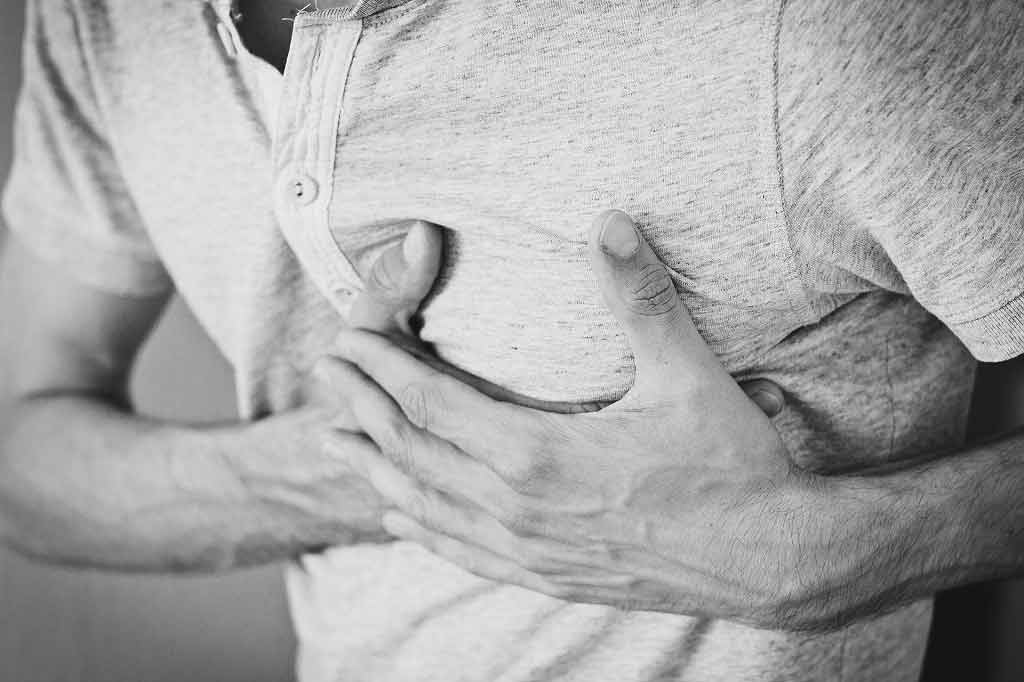Smoking, diabetes and high blood pressure increase risk of heart attack more in women than men
Heart and lungs

'Women who smoke, have diabetes or high blood pressure increase their risk of a heart attack more than men faced with the same risks' BBC News reports
"Women at greater risk of heart attack from unhealthy lifestyle than men," reports The Daily Telegraph.
Overall, men have a higher chance of heart attack than women, but certain risk factors such as smoking may close the gap between women and men.
Researchers looked at records of almost 472,000 people in the UK aged 40 to 69. They found that, overall, men had a far higher risk of heart attack than women over 7 years of follow-up. However, the effects of smoking, diabetes and high blood pressure raised women's relative risk of a heart attack more than they raised the risk in men.
For example, female smokers had about 3.4 times the risk of having a heart attack as women who had never smoked, while male smokers had 2.2 times the risk of men who had never smoked.
The researchers warn that women could eventually "catch up" with men's heart attack risk, as the population ages and conditions such as diabetes and high blood pressure become more common. They say doctors need to be more alert to the risk of heart attacks in women, and ensure women with high blood pressure and diabetes are given access to the best treatments for their condition and advice on heart attack prevention.
Find out more about keeping your heart healthy.
Where did the story come from?
The researchers who carried out the study came from the University of Oxford. The study was funded by the UK Medical Research Council and the National Health and Medical Research Council. It was published in the peer-reviewed British Medical Journal on an open-access basis so is free to read online.
The coverage in the UK media was mixed as some sources failed to make clear that an increase in relative risk is not the same as an increase in absolute risk.
One way of understanding the difference is to imagine you bought a lottery ticket and the next hour you bought a second ticket. Your relative "risk" of winning the lottery would increase by 100% but your absolute risk would still remain extremely small.
The Mail Online's headline: "Overweight women are increasing their chances of suffering a heart attack more than overweight men," is incorrect as researchers found no difference in relative risk of being overweight between men and women.
While the Telegraph's explanation that "per person, smoking, high blood pressure and diabetes produced a higher chance of heart attack in women compared to men" is unclear. Men's overall absolute risk of having a heart attack remains higher. But smoking, high blood pressure and diabetes increase a woman's relative risk by more than they increase a man's relative risk.
BBC News explained the study well in a balanced article.
What kind of research was this?
This was a cohort study, using data from a large ongoing study of UK adults. Researchers wanted to untangle the effects of different risk factors for heart attack on men and women, at different ages.
A cohort study is a good way to look at the effects of risk factors on large groups of people. However, they cannot prove that the risk factors directly cause the outcome (heart attack in this case) because other factors may be involved.
What did the research involve?
Researchers used data from the UK Biobank, a study that recruited half a million UK adults aged 40 to 69 between 2006 and 2010. Participants had various checks and tests including blood pressure, weight and height, and filled in questionnaires about their lifestyle and medical history.
For this study, researchers focused on:
- history of cardiovascular disease
- diabetes status (for example a confirmed diagnosis of type 1 or type 2 diabetes)
- atrial fibrillation (irregular heartbeat)
- blood pressure measurements
- smoking status/history
- body mass index
- whether they were taking drugs to treat diabetes or high blood pressure
Socioeconomic status was assessed by postcode. People were tracked through health records to see if they had a heart attack during the next 7 years.
Using this data, researchers looked at the links between blood pressure, smoking, diabetes, BMI, atrial fibrillation and socioeconomic status and heart attack, carrying out analyses separately for men and women. They also looked at the risks in 5-year age bands to see how age affected the results.
What were the basic results?
After an average 7 years of follow-up, 5,081 people had a first heart attack. More men than women were affected, with 71% of heart attacks in men and 29% in women. This difference levelled off slightly among those aged 65 and over.
High blood pressure
Researchers found men and women with high blood pressure had a higher chance of heart attack. More severe high blood pressure increased risks more for women than for men.
Stage 2 hypertension (160/100mmHg or more) increased risks for women by 252% (hazard ratio (HR) 2.52, 95% confidence interval (CI) 2.04 to 3.13) while it increased risks for men by 171% (HR 1.71, 95% CI 1.46 to 2.01)
Smoking
Smokers and former smokers had an increased risk of heart attack, but this increase in risk was more pronounced in women.
Women smokers had a 346% increased risk (HR 3.46, 95% CI 3.02 to 3.98) compared to women who had never smoked, while men who smoked had a 223% increased risk (HR 2.23, 95% CI 2.03 to 2.44) compared to men who had never smoked
Diabetes
Women with type 1 diabetes had an 818% increased risk of a heart attack compared to women without diabetes (HR 8.18, 95% CI 5.20 to 12.86). Men with type 1 diabetes had a 281% increased risk of heart attack compared to men without diabetes (HR 2.81, 95% CI 1.82 to 4.33).
Women with type 2 diabetes had a 96% increase in risk of a heart attack (HR 1.96, 95% CI 1.6 to 2.41) compared to women without diabetes and men with type 2 diabetes had a 33% increase in risk of a heart attack (HR 1.33, 95% CI 1.18 to 1.51) compared to men without diabetes.
Body mass index
While being overweight or obese was linked to an increased risk of a heart attack, there was no difference in the increase in risk between men and women.
Atrial fibrillation
Atrial fibrillation was not linked to an increased risk of a heart attack for women, although it was linked to a slightly higher risk for men.
The effects of risk factors such as blood pressure decreased over time for men and women, while chances of heart attacks increased with increasing age. However, the difference in the impact of risk factors on men and women persisted.
How did the researchers interpret the results?
The researchers said: "Our findings suggest that clinicians should be vigilant when their female patients are elderly, smoke, have diabetes or have high blood pressure." They say their findings also highlight "the importance of equitable access to guideline-based treatments for diabetes and hypertension, and to weight loss and smoking cessation programmes for women and men in middle and older age".
Conclusion
The study shows the big impact that factors like smoking, high blood pressure and diabetes can have on the chances of having a heart attack.
While the risk increases for women are bigger than for men, the risk increases for men are still substantial. The study underlines the importance of not smoking and of keeping blood pressure and diabetes under control, for both women and men.
There are some limitations to the study:
- the data on smoking, diabetes, atrial fibrillation and drugs taken for these conditions was self-reported, which means it may not be accurate
- we don't know about some important risk factors for heart attack, such as people's cholesterol levels
- some participants did not answer all questions, especially about smoking where more than 5% of people did not say how many cigarettes they smoked daily
While the overall risk of a heart attack remained far higher for men than women in the study, it does serve to point out that certain groups of women have a much higher risk than other women. It's important to be aware of the risk of a heart attack, especially if you are a woman in one of the higher risk groups.
Symptoms of a heart attack are sometimes less clear in women than men. Symptoms can include chest pain, pain in the arms, jaw, neck and back, feeling dizzy, sweating, shortness of breath, feeling sick, feeling anxious or panicky, coughing or wheezing. Pain may not be severe, and sometimes women or people with diabetes don't feel any pain, or a minor pain like indigestion. If you suspect someone is having a heart attack, it's a medical emergency. Call 999 right away and ask for an ambulance.
Find out more about heart attack symptoms.






 Subscribe
Subscribe Ask the doctor
Ask the doctor Rate this article
Rate this article Find products
Find products








